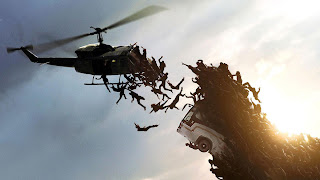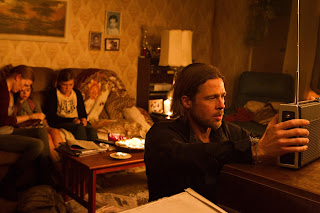Look.
On most every other blog right now you can find an article about World War Z. Not only is it a huge
blockbuster that just came out, did well enough to merit a greenlit sequel and
stars Brad Pitt, it’s also based on a beloved book that it has virtually
nothing in common with. Everyone is talking about it. Everyone.
Because sometimes it seems that the only time we manage to overcome our differences is right before they cease to make any difference at all.
I
mean we literally just did a Crossover Appeal on it.
But
I want to talk about the one thing people seem to not be talking about right
now. The movie itself.
I
don’t mean the movie in relation to the book, or the movie in relation to other
zombie movies. Even the movie as it relates to other outbreak or contagion
movies. I want to talk about World War Z
the movie. That’s it.
Good?
Good.
I
really liked it.
It
was intense, in an adrenaline pumping “holy crap I am never sleeping again”
kind of way, while still remaining intellectually engaging. The action was
varied and imbued with enough emotion that I was never bored, and the whole
thing did a good job balancing the global stakes alongside the personal ones.
Various socio-political issues were teased out, and the ending was left
blissfully ambiguous. Cynical people might suggest that this was to provide
room for a sequel, which is true, but it also fits the tone of the film
overall. In general, it’s just good and I think you should watch it if you have
anything resembling a strong stomach.
But,
as always, let’s break it down. The movie, as mentioned before, is nominally
based on Max Brooks’ book by the same name. While that book is a
multi-narrative oral history a la Studs Terkel’s war writings, the film follows
one protagonist, Brad Pitt’s Gerry. Gerry is a retired UN investigator (or as
one review memorably called him, the UN’s ninja), who finds himself running for
his life when the zombie apocalypse comes.
Gerry
and his wife, Karin, who was played fabulously by Mireille Enos (who really
needs to get more roles than just “saintly wife”), are trapped in Philadelphia
when the apocalypse starts, and have to struggle to get themselves and their
two daughters out. The stakes are incredibly high, and when they do get out,
having gained another child along the way, you feel their relief and joy to be
taken to an aircraft carrier where they’re safe.
Of
course this isn’t the end of the story. Since Gerry is a UN ninja, and they
have to figure out how to stop the zombies, Gerry is given a choice. He can go
out and try to find out how this whole mess started or he and his family can
leave the safety of the aircraft carrier. Obviously this is not much of a
choice.
And
so our story goes. Gerry and a group of soldiers accompany a doctor who wants
to figure out the disease, traveling all the way to an army base in Korea that
seems to have been the start. Except it wasn’t, and all the soldiers and the
doctor die while they’re there. Then they go to Jerusalem, which is miraculously
not overrun with zombies, only to see it become overrun with zombies, and our
hero has to escape, etc. It’s very action film, with lots of overseas
locations, action set pieces, and lots of zombies, but there’s something else
lingering there, in the background of each scene.
It’s
realism.
Again,
try to think of this as just a movie, and not as a movie based on a beloved
(but very different) book. While it’s certainly been Hollywood-ized in some
respects, like with Gerry’s uncanny ability to not die, World War Z is hands down the most intriguing and potentially
realistic zombie movie I have ever seen. And it’s just plain good to boot.
What
makes the story feel real isn’t the action, the plot, or even the really
brilliant political stuff (which is brilliant). It’s the characters.
I
feel like I end up saying this all the freaking time, but I don’t care.
Characters make or break a story. Characters make or break a story. Characters
make or break a story!
While
Gerry isn’t the most interesting guy in the world, what with him being an
upper-middle class white dude with ninja skills, he’s at least relatable. You
really like him, and when he finds himself in trouble, you feel worried. Brad
Pitt’s a great actor, and the moment when you most love his character is
actually completely in the character work. Gerry’s trying to sneak silently
past some zombies when his phone rings, because Karin is trying to call him on
satellite phone. Naturally the zombies attack and it’s brutal and very tense,
but later on, when he reaches her, Gerry doesn’t castigate her or complain, he
just sighs and says it wasn’t a good time.
That’s
an interesting character. Or at the very least, a likable one.
The
other characters are pretty cool too. While some seem to be very disposable (I
respect the film’s willingness to murder its characters), others stick around,
and those that do are intriguing, no matter how much screentime they get. Like
I said, Mireille Enos is amazing as Karin. Worried but holding it together for
her kids. Fighting for their place in a world of dwindling resources. And
quietly raging when the fight turns sour.
Or
take Segen. Segen (just the one name, and how cool is that?) is an Israeli
soldier that Gerry manages to get out of Jerusalem when the city falls. She’s
young, trigger-happy, and missing a hand that Gerry had to cut off to stop
infection, but she’s also quiet, contemplative, and incredibly competent. Segen
barely gets two minutes to make us love her, and she does, purely by the way
she screams when Gerry cuts off her hand, but gets up and keeps running afterwards.
And
we can’t forget the WHO doctor, played by Ruth Negga, who helps Gerry navigate
the zombie infested WHO headquarters looking for a way to incapacitate the zombies.
A woman whose entire office was infected, had to help block off half the
building, and then stuck around to try to find a cure. Love her.
I
could keep illuminating the characters I loved in this film, but I don’t want
to obscure the larger point. Namely, characters make the story.
World War Z is a good movie because it has good characters. The
story, when you strip away the really great special effects and the gorgeous
locations, is actually pretty simple. The reason it works, the only reason it
works, is because we’re emotionally invested in it. And the only reason we’re
emotionally invested in it is because the characters are good.
So
go watch it, dammit. And stop complaining about how it’s different than the
book. Different doesn’t mean bad. It just means different.
Oh,
and one final thing. The socio-political stuff? Is well written and genuinely
touching. While some people complain that there isn’t enough of it, what there
is is beautifully done. It broke my heart to see the scenes in Israel, where the
government took precautions against the plague and now use Jerusalem as a place
of refuge for those escaping. Watching Muslims, Jews, and Christians singing
and dancing as they got let into the holy city, and then watching zombies tear
them apart? I cried.







No comments:
Post a Comment